Water’s Flow
An Artist’s Path in a Trans-local Universe
It’s a particularly frigid night in New York City. I’m sitting in a sparsely furnished apartment in the midst of a plethora of papers, calendars and various deadlines that demand my attention. A colleague has just had the premiere of his new play postponed in Washington D.C. and another colleague has just lost her day job. The future within and under the OWS (Occupy Wall Street) movement signals hope round its rallying cry. So, although, the climate, financial and otherwise, seem bleak, the radiant and passionate shouts stirring in the already liquid memory of this wintry night offer if not the promise of a steady paycheck or a stable economic life lived in the continuing ethics of precariousness demanded of artists without trust funds to cushion the low times, then at least the promise of an occupation: the doing of taking charge of one’s life and communities: the action of protest and resistance and trying to sustain a peaceful, tolerant, and balanced life. As a concerned citizen who happens to also wear a writer’s hat, I have been researching the effects of the 2010 Deepwater Horizon BP oil spill for the last two years. While I am not the only theater artist interested in the overwhelming environmental situation in the Gulf of Mexico region, I have been surprised that so very little of our many, plentiful, vibrant stages as a whole have been concerned with environmental issues that run hand in hand with issues of economic disadvantage, indigenous cultures being further marginalized and/or discarded, and ways of life and living that are being erased by either new technologies, callous and careless environmental practices, and the erosion of basic civilities in favor of corporatized “dealings” with the facts and fragilities of human and natural life. The Way of Water, for me, began, thus, as an activist and playwright’s need for expression as well as the second in a quartet of “simpler” plays that began last year with Guapa, a play about a lower income US Latino, mixed race family in west Texas that galvanizes its dreams of advancement around women’s soccer, astrophysics, education and activism. Both of these plays draw upon not only research that I’ve conducted but also travels over the years in and around the Southern section of this country. As any writer knows, travel is more than just picture-taking and dropping into what people do in this and that town, and what they eat and drink. Travel is a spiritual endeavor. It asks the traveler to listen, observe, and record in mind and thought the images, gestures, voices, languages, places, and textures of the traveler’s path. When you travel, in other words, you are both in local time and transcending your locality. The thought-images stored in the brain stay with you over time wherever you go and accrue meaning in different ways that you cannot even begin to predict or imagine. Now, what is a Philadelphia-born gal talking about when she talks about being Southern? I spent a great deal of my formative years in both southern Florida and North Carolina. I wrote my first play, which is hidden in a university archive under lock and key somewhere in the vaults of Ohio State University, in Hialeah, Florida. I wrote my first produced full length play, while still a teenager, in North Carolina. The play was called Waterfall, and although it was about quite an odd, dysfunctional American family, its central theme was toxic damage caused by a landfill that sat next to the house where my characters lived. So, you see, water, toxicity, and the complications and hazards of being disposed of in society have been, interestingly enough, throughout my writing life, a not so unlikely returning theme. Curious thing, this writing thing—this strange muscle that calls up words and phrases and songs and accents and lives heard and unheard to being. Curiouser still to find yourself shifting through layers of research (with dramaturge Heather Helinsky and assistant dramaturge R. Alex Davis) to put together a multiple reading scheme of The Way of Water not because it’s an act of pitching, but because you care so much about the issues involved, about raising awareness, that you say, hey, let’s just not wait, let’s make our theater lo-fi and script in hand, and wherever we find our tribe to speak out about what is happening in our country and in our world, and how art can hopefully transform a rendering of life into something that is, well, poetry. Maybe. If you’re lucky. And to be able, thus, to broadcast without a microphone. In the month of April and May 2012, over twenty-five venues across the US and some abroad too will take part in the reading scheme for The Way of Water as a way to mark the two year anniversary of the 2010 BP oil spill and raise awareness to the continued health and environmental issues plaguing the Gulf of Mexico region. Communities all over, of different sizes and shapes and economic means, will gather to witness and participate and share in a dialogue, which won’t stop with these readings, and certainly won’t stop when the play lands production, but will continue, I hope, in paying attention to, giving love and credence to all of our citizens and not just some. About thinking hard and fast too about who funds what and why, and do they take money to make their art or food or whatever it is they make from companies that make theirs putting the cost of human and natural life at irrevocable risk to those involved and then making adverts saying how peachy everything is? Even if the advert is good, even if it’s beautifully lit, what stories are being hidden and why? The Way of Water is, as I like to say, “a simple play.” It is unmarked by overtly formal structural flourishes or flashy moments of spectacle. Its mode is for the most part quiet and sensual, and its lens is firmly fixed on the characters’ give-and-take, ebb-and-flow, and various emotional turns. What happens in the play—to these characters, to these people wracked and wrecked by a world turned upside down—is not simple at all. In fact, it’s quite devastating. But my choice as a writer to tell their story theatrically in what I deem a “simple” or “no fuss” manner is deliberate. I want my audience to focus on these people and who they are in place and time, to empathize with them and feel as if they know them. My goal as a writer with this play is to “step out of the way” and let the story flow and fly as it needs. “Write it with an easy hand,” one of my writing teachers used to say, “If you trust your skills as a writer, the rest will flow.”
As any writer knows, travel is more than just picture-taking and dropping into what people do in this and that town, and what they eat and drink. Travel is a spiritual endeavor. It asks the traveler to listen, observe, and record in mind and thought the images, gestures, voices, languages, places, and textures of the traveler’s path. When you travel, in other words, you are both in local time and transcending your locality.
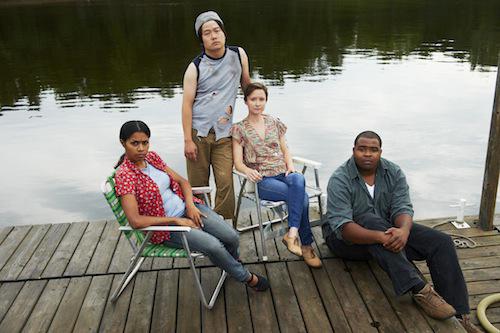
The Playwrights Center in Minneapolis, Minnesota. Photo by Tony Nelson.
*
Flow is something, as a poet, songwriter and playwright, I’ve always believed in. Follow the flow, let it tell you, speak through you, let it breathe as it may, and see what kind of play or poem or song is meant to be. I think, however, the focus on formal and stylistic “simplicity,” for me, has had as much to do with how I perceive the role of theater in an increasingly jacked-in, wired-up, frenetic culture, and the various, multiple avenues it offers for multi-platform communication. As a writer, for many years, my work for the theater has been notably marked by its hyperlinked dramaturgy and its fractured poetic formalism. I have been craving as a writer to un-plug my work from mediated dramaturgical strategies that have deliberately incorporated and scored into my texts projection and video design, and actually “return” to “simpler” means of communication on stage. In effect, to “go back” to my first, initial loves of theater, which were and continue to be: the movement of the human body in space, the embodiment of language, the lifted vernacular and poetic voice, and theatrical environments indebted to the natural world. When I first traveled down to Gulf of Mexico region, I was merely “dropping in.” I’d not intended to write a play set in Louisiana, Texas, Mississippi, or Florida. I was just taking some time off (and this was pre Hurricane Katrina) and wandering a bit. The travels yielded notes in my writer’s journal of people and places seen, and moreover, aspects of the natural world that I found fascinating in contrast to, say, sections of the US Midwest or the Northeast. After Hurricane Katrina, I went down to New Orleans for a very brief visit and was naturally struck by how this beloved city had changed, and would be forever so. Escaping to Florida for some time after yielded more observations about the process of change upon its varied landscape. What I remember most from this second set of travels was that my note taking centered, despite my focus on landscape, much more on the people I encountered along the way. The people that I met became the people that I imagined into the plays Guapa and into especially The Way of Water. It was their stories, their faces, and their word-songs that populated my imagination and transcended politically abstract notions about dispossession, hard-won lives, and the quality and necessity for political rage and outrage—for, in effect, indignation. As a child of working class, immigrant parents and as a freelance artist living most of the time as precariously as they come, I know something, if not much, about living paycheck to no check, gig to no gig, and temporary housing to guest housing and beyond. My life and path as a playwright in this country has been nomadic, irreconcilable, and absolutely unpredictable. My focus as a writer has nearly always been, despite whatever formal strategies are operative on the page, to tell stories on stage about those that hardly ever get written, and those who may be forgotten over time. My plays are filled with ghosts and ancestors and characters that make themselves up as they go along. Inventors of Self. Inventors of Being in the World. Making do. Getting by. And hopefully leaving a mark. Along the way. If in the last fifteen years or so, my formal theatrical means has leaned more toward the dark and netherworld and mythic, toward characters speaking back to their own myths, reconfigured from the classics, and torn from the pages of history, then this new series of plays that are in the process of being, becoming and living are more about recording the here and now, and letting the open-hearted, emotional and very human expression of self and being-ness come to bear upon my storytelling. I used to say that at one time I wrote “acoustic” plays. I suppose that this “return” in my writing is toward the acoustic, because I feel that, for now anyway, the “electric” is exhausted and exhausting and speaking culturally all the time at me, at us, at everyone 24/7. Onstage, what I yearn for more than anything these days, as audience and practitioner, is the joyous delight in bareness, in stripped-down theatrics, and unapologetically humanist expressions of art-making that still strive for and live in the poetic realm—the realm of the transcendent that allows the local story to become trans-local without losing its locality. This desire to “return” to less plugged-in means of dramatic expression on both content and formal levels (despite my ardent love of mediation and its possibilities on stage) is part and parcel with what I am calling, for lack of better terminology, but moreover for geographic reasons as explicated by my travels above, my return to Southern roots. As a writer, I feel very strongly that our obligation is to write inside and outside our skins, genders, ethnicities and time (historical and otherwise). Write what you know and what you don’t know. Write outside yourself to find yourself. Write to take the imaginative leap of absolute freedom that so very few writers can afford in countries where censorship and oppression and repression exist. I write outside myself and inside myself, through and beyond my skin and sex, to tell a story and let it live on stage in flesh and blood time so that it may engage in a dialogue spiritual and civic with an audience. In The Way of Water, a character says “love and family are the same thing.” The statement is said casually, almost as a throwaway. I don’t even know where the line came from. It surprised me when I wrote it. But interestingly enough, the line keeps resonating for me. Who we love, how we love, what we make of love and what becomes and is our history, our recorded and variant storytelling of lives lived in this world, are united. Who we love and whom we choose to discard and cast out of love through laws and edicts and referendums tells our history back to us.
I want my audience to focus on these people and who they are in place and time, to empathize with them and feel as if they know them. My goal as a writer with this play is to “step out of the way” and let the story flow and fly as it needs. “Write it with an easy hand,” one of my writing teachers used to say, “If you trust your skills as a writer, the rest will flow.”
*
For over twenty years I’ve been making plays and theater pieces, and also have founded (in 2003) a far-flung and still evolving international theater alliance entitled NoPassport. I ponder what the present and future of a life without a “passport,” and how in this era of seeming multiplicity of accessible means in the wired world, virtual and otherwise, an artist can still manage to make work, carry forth, and not depend on the visibility of a culture that is constantly, “infinitely demanding” (to paraphrase Simon Critchley) presence: active, connected, plugged in. How, in effect, to continue to engage in the beautiful, radical, open source democracy that no infrastructure provides and yet still, pay the bills, live a meaningful life, and make art regardless of culture’s demands? Winter thoughts on a winter’s evening. In the calm and solace of a stark room furnished with bits of things and the trinkets of travels and papers and plays of a writing life, marked by the buzz of the virtual, the chime of a text message, and the music streaming from a device randomly shuffling music from a few decades or so in historical time. Arizona in April for the 2012 NoPassport Conference at ASU looms on the busy horizon, as do the readings of The Way of Water in, among others, St. Petersburg, New York City, San Diego, Pittsburgh, Richmond, Albuquerque, Omaha, Sao Paolo, Berlin, London, Pretoria (South Africa) and Wales. The pull of the “simple” bleeds on the page stories of people left behind on many of our US stages. Nothing noble in this “simple,” says I, as the night burns in its buzzing quiet of disparate tones. Just telling stories true. Hoping they stick for a time, before they too move on, like we all do in this life.

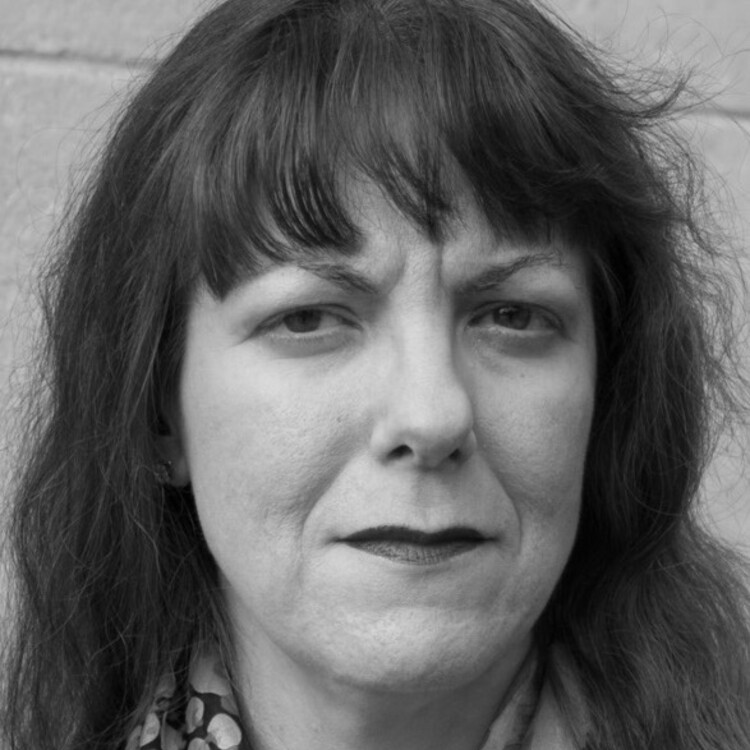
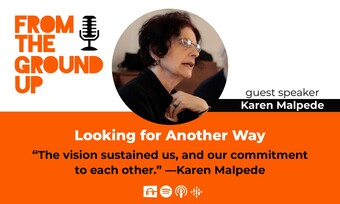


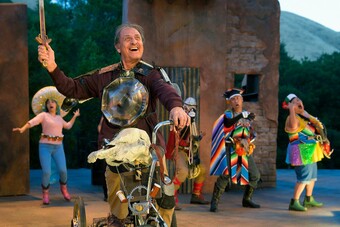



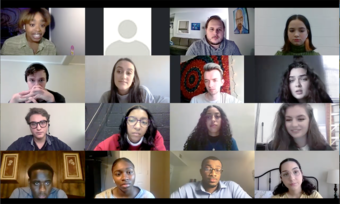


Comments
The article is just the start of the conversation—we want to know what you think about this subject, too! HowlRound is a space for knowledge-sharing, and we welcome spirited, thoughtful, and on-topic dialogue. Find our full comments policy here
Brava! We need more plays that examine and reflect the issues of our times.
Thank you for your beautiful post. I'd like to know more about the reading of The Way of Water in Pittsburgh? When is it, where? Will you be here?